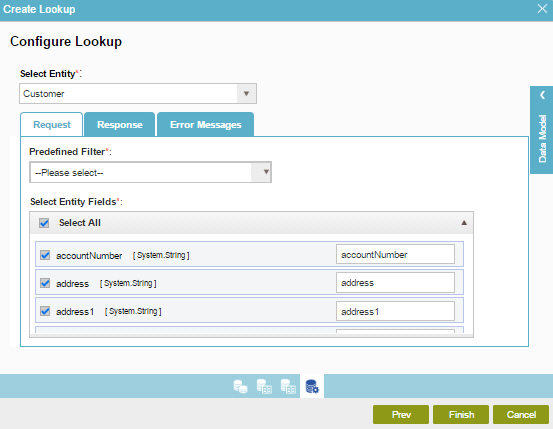Configure Lookup for NetSuite > Predefined Filter Multiple Columns > Request tab
Configures a lookup with more than one column from your data source with a filter from NetSuite.

Good to Know
- Some information about third-party integrations is outside the scope of the AgilePoint NX Product Documentation, and it is the responsibility of the vendors who create and maintain these technologies to provide this information. This includes specific business uses cases and examples; explanations for third-party concepts; details about the data models and input and output data formats for third-party technologies; and various types of IDs, URL patterns, connection string formats, and other technical information that is specific to the third-party technologies. For more information, refer to Where Can I Find Information and Examples for Third-Party Integrations?
How to Start
- On the Application Explorer screen, do one of these:
- Do one of these:
- Add your form control:
- On the eForm Builder screen, in the Toolbox, open one of these tabs:
- Common Controls

- Advanced Controls

- Telerik Controls

- Common Controls
- On your tab, drag one of these controls onto your form:
- Auto-Suggest

- List Box

- Subform

- Check Box

- Auto Lookup

- List View

- Pop-Up Select

- Drop-Down List

- Auto-Suggest

- Chart

- Data Grid

- Drop-Down List

- Data Grid

- Multi-Select List Box

- Auto-Suggest
- On the eForm Builder screen, in the Toolbox, open one of these tabs:
- Change your form control:
- On your eForm, click the control, and click Edit
 .
.
- On your eForm, click the control, and click Edit
- Add your form control:
- On the Configure tab, click Add Lookup
 .
. - On the Select Data Source Type screen, select NetSuite
 , and click Next.
, and click Next. - On the NetSuite Filter Type screen, select Use Predefined Filter, and click Next.
- On the Lookup Details screen, select Multiple Columns, and click Next.
- On the Configure Lookup screen, click the Request tab.
Fields
| Field Name | Definition |
|---|---|
Entity |
|
Predefined Filter |
|
Select Column - Name |
|
Select Column - Value |
|
Expand |
|
Collapse |
|



